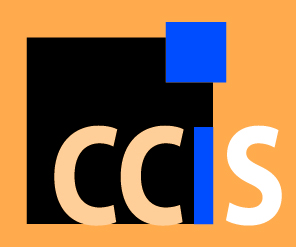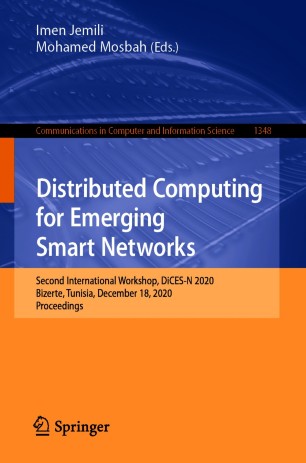The organizing team is closely monitoring the development of the COVID-19 situation. In case of travel restrictions that prohibit physical attendance, the conference will be held in an alternative way using distance presentations in order to ensure both the safety of participants and wide dissemination. .
Aims and Scope
Nowadays, the global vision is the progressive migration towards smart cities in order to enhance the citizen life and to encounter many problems induced by population growth and increased urbanization, such as traffic congestion, air pollution, etc. These smart environments can be viewed as interconnection of wide-scale cyber-physical systems, with sensors monitoring cyber and physical indicators to collect diverse information from the surrounding environment and with actuators dynamically changing the complex urban environment in some way. Through such systems, many innovative applications can be proposed in several fields of activity, such as smart living, smart mobility, smart economy, smart environment and smart governance. As human factor is involved in many applications, verifying and proving the validity and correctness of protocols and applications are crucial steps before deployment, in addition to ensuring other paradigms such as scalability, energy saving, resource constraints, etc. In this context, several methods and approaches of Distributed Computing are exploited in software and hardware to propose new approaches able to support and analyse the huge amount of collected information and to deal with the control of these emerging networks.
The workshop aims to be a majorforum for researchers and practitioners, interested in the design, development and evaluation of distributed systems, platforms and architectures for Cyber Physical Systems in the context of smart cities. Highlights of the workshop will include a high quality single-track technical program and an invited speaker.
Main Topics of interest
Authors are invited to submit original and unpublished contributions inall aspects of Distributed Computing applied to CPS and to real cases in the context of emerging networks. Topical areas of interest are, but not limited to, the following:
- Self-organization, self-stabilization, self-healing and autonomic computing for CPS
- Distributed algorithms for emergent wireless networks
- Communication and networking distributed protocols for emergent wireless networks
- Artificial intelligence and machine learning applied to Cyber Physical Systems and smart cities applications
- Machine intelligence in Cyber Physical Systems and real time analytics
- Optimization, approximation methods for Cyber Physical Systems and smart cities applications
- Security and privacy of distributed systems in the context of CPS
- Modelling and performance evaluation
- Performance analysis : complexity, correctness, scalability
- Robustness, fault-tolerance, scalability and real-time in the context of CPS
- Verification and validation of algorithms and applications in the context of CPS
- Network virtualization and software-defined wireless networks
- Cognitive communications and networking
- Mobile fog/edge/cloud computing
- IoT Computing and Networking and applications
- Context-awareness in wireless, mobile networks
- Energy-Efficient Designs
- Smart city applications: e-health, smart transportation,…
- Wireless and Mobile Networks: Adhoc networks, VANET, WSN, 5G,…
- Signal processing and applications in the context of smart city applications
Paper Submission:
October 04, 2020
Author Notification: October 27, 2020
Camera-ready Copy Submission: November 3, 2020
Author Registration: November 3, 2020

The DiCES-N 2020 proceeding will be published by Springer in the Communications in Computer and Information Science series CCIS (http://www.springer.com/series/7899).

Indexing: The books of this series are indexed in Scopus, DBLP, Google Scholar, EI-Compendex, Mathematical Reviews, SCImago.
Previous Edition :
DiCES-N19
Workshop Committee
General co-chairs
Imen Jemili, Dr. University of Carthage, Tunisia
Mohamed Mosbah, Pr. Bordeaux INP, France
TPC co-chairs
Sabra Mabrouk, Dr. University of Carthage, Tunisia
Soumaya Dahi, Dr. University of Carthage, Tunisia
Akka Zemmari, Dr. (HDR) University of Bordeaux, France
Publicity chair
Emna Ben Salem, Dr. University of Carthage, Tunisia Rim Negra, Dr. University of Manouba, Tunisia
Program Committee
Salma Batti, University of Carthage, Tunisia
Raoudha Beltaifa, University of Manouba, Tunisia
Anis Ben Aicha, University of Carthage, Tunisia
Lotfi Ben Othmane, Iowa State University, USA
Kamal E Melkemi, University of Batna 2, Algeria
Ahmed EL Oualkadi, National school of applied sciences of Tangier, Morocco
Mohammed Erradi, ENSIAS, Morocco
Parvez Faruki, Computer Engineering Department, MNIT Jaipur, India
Matthieu Gautier, University of Rennes 1, France
Tahani Gazdar, University of Jeddah, KSA
Fadi Kacem, University of Carthage, Tunisia
Moez Krichen, Albaha University, KSA
Bacem Mbarek, Masaryk University, Brno, Czech Republic
Neha Pattan, Google, USA
Slim Rekhis, University of Carthage, Tunisia
Ali Safaa Sadiq, Monash University, Malaysia
Gautam Srivastava, Brandon University, Canada
Eiad Yafi, University Kuala Lumpur, Malaysia
Anis Yazidi, Oslo Metropolitan University, Norway
...
Submission Guidelines
Authors are invited to submit original and unpublished contributions for this workshop. Submissions must not be currently under consideration somewhere else.
Authors should consult Springer’s authors’ guidelines and use their proceedings templates, either for latex or for Word, for the preparation of their papers (Springer’s proceedings LaTeX templates are available in Overleaf). A paper should be 12–15+ pages long (of Springer format). Papers longer than 15 pages can be accepted, if justified by the quality of the content.
Springer encourages authors to include their ORCIDs in their papers. In addition, the corresponding author of each paper, acting on behalf of all of the authors of that paper, must complete and sign a Consent-to-Publish form. The corresponding author signing the copyright form should match the corresponding author marked on the paper. Once the files have been sent to Springer, changes relating to the authorship of the papers cannot be made.
All paper submissions will be handled through the Easy Chair conference management system. If you have used this system before, you can use the same username and password. If this is your first time using EasyChair, you will need to register for an account by clicking "create an account" link. Upon completion of registration, you will get a notification email from the system and you are ready for submitting your paper. You can upload and re-upload the paper to the system by the submission due date.
For any request, please contact :
Soumaya Dahi, Dr.
University of Carthage, Tunisia
 Sabra Mabrouk, Dr.
University of Carthage, Tunisia
Sabra Mabrouk, Dr.
University of Carthage, Tunisia

Camera Ready Submissions
The accepted papers for publication must have between 12 and 20 pages.
Your contribution may be prepared in LaTeX or Microsoft Word. Technical Instructions for working with Springer’s style files and templates are provided in separate documents which can be found here.
- We need all source files (LaTeX files with all the associated style files, special fonts and eps files, or Word or rtf files) and the final pdfs of all of the papers. Please note that we cannot accept Framemaker files.
- References are to be supplied as Bbl files to avoid omission of data during conversion from Bib to Bbl. Our preferred bibliographic styles are MathPhySci (particularly for computer science) and Basic.
- Affiliations, Email-Addresses, and ORCIDs. The affiliated institutions, including town/city and country, are to be listed directly below the names of the authors. Multiple affiliations should be marked with superscript Arabic numbers, and they should each start on a new line. We encourage authors to include their ORCIDs in superscript next to their names.
Please place an envelope icon (or any other pointer) next to the name of the corre-sponding author, whose email address is mandatory, in the header of the paper. Email addresses should start on a new line directly under the corresponding affiliation.
We strongly recommend that all authors include their email addresses in their pa-pers. These will be used by Springer to provide authors with a personal MySpringer account where they can download a free copy of the eBook.
A prefilled copyright form is available here. One author may sign on behalf of all of the other authors of a particular paper, providing permission has been given to do so. In this case, the author signs for and accepts responsibility for releasing this material on behalf of any and all co-authors. Digital signatures are not acceptable.
You should submit your paper and the signed and completed copyright form using your EasyChair proceedings author role for DiCES-N20
REGISTRATION
In order to have your paper included and published in the workshop proceedings, at least one author has to register and present the paper at the workshop. All information will be sent to authors via EasyChair by the organizing committee.
PROGRAM
(Final program)
December 18th, 2020
| 08:45 |
Opening |
| 09:00 |
Session 1 : Intelligent Transportation SystemsChair : Imen JemiliAmeni Chetouane, Sabra Mabrouk and Mohamed MosbahTraffic Congestion Detection: Solutions, Open issues and Challenges. Twahirwa Evariste, Willie Kasakula, James Rwigema, and Raja Datta Pollution context-aware representation in vehicular internet of Things for smart cities. Haifa Gharbi and Sabra Mabrouk ROI extraction for intrusion detection in platoon join maneuver. |
| 10:30 |
Session 2 : Emerging Networking TechnologiesChair : Soumaya DahiAkram Hakiri, Bassem Sallemi, Fatma Ghandour, and Sadok Ben YahiaSecure, Context-Aware and QoS-enabled SDN Architecture to improve Energy Efficiency in IoT-based Smart Buildings. Amna Fekih, Sonia Gaied Fantar, Habib Youssef Quality of Experience aware Replication Framework for video streaming in Content-Centric Mobile Networks based on SDN Architecture. Emna Rbii and Imen Jemili Leveraging SDN for Smart City Applications Support. |
| 12:00 |
Session 3 : Artificial Intelligence and Internet of ThingsChair : Akka ZemmariSafa Ayadi, Ahmed ben said, Rateb Jabbar, Chafik Aloulou, Achraf Chabbouh, and Ahmed Ben AchballahDairy Cow rumination detection: A deep learning approach. Wala Kharouf and Mohamed Abid EAP-NOOB-KRB for mutual authentication in IoT environment. |
Proceedings
CCIS 1348 is now available online. You can access the online version here

STAY INFORMED
Don't miss the event!